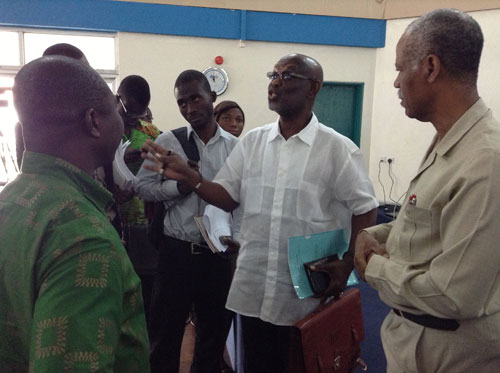 A former Minister of Finance and Economic Planning, Dr Kwesi Botchwey, has called on the government to develop the courage to resist the temptation of spending on projects and programmes that have not been properly budgeted for in any particular fiscal year.
A former Minister of Finance and Economic Planning, Dr Kwesi Botchwey, has called on the government to develop the courage to resist the temptation of spending on projects and programmes that have not been properly budgeted for in any particular fiscal year.
The move, he said, was one of the key ingredients to avoiding the huge deficits that often derail the macroeconomic fundamentals of the country.
It would also save the government the burden of having to roll over huge arrears from previous years into a new fiscal year and be cash-trapped, he explained.
Sharing his thoughts on the country’s fiscal deficit at a forum organised by the Institute of Economic and Financial Journalists (IFEJ) with support from Star Ghana on the prosecution of the 2013 budget, Dr Botchwey said much as that might be difficult, there was the need to ensure that spending was prudent and “has value for money”.
The budget deficit rose to US$4.9 billion in 2012, up from the US$3.54 billion recorded the previous year.
In the same year, the current account deficit was 12.3 per cent of the Gross Domestic Product (GDP) which is value of goods and services produced in the country, compared to the 2011 figure of nine per cent of that year's GDP.
Public Investment Programme
Consequently, Dr Botchwey urged the government to adopt what he described as the Public Investment Programme (PIP), which helps to define the criteria for admitting any project into the budget.
The former finance minister is credited for being the first to balance Ghana’s budget and even recording a marginal budget surplus of 0.1 per cent of GDP. He also led the team that halted the country negative GDP growth into positive growth in the early 1980s.
He said “if a project to be undertaken in the budget is of a commercial value we need to ensure it is profitable and if it is a social programme, we need to ensure it is cost-effective”.
“If we allow the programmes in the budget to satisfy these criteria and make sure that they are the cost and have value, we will be seen to be doing the right things to avoid a deficit,” he added.
Dr Botchwey said “in the budget you have the current expenditures, wages and salaries and so on, and you have the development budget; if you want to manage the finances well and you must cut expenditures in the cause of the year, the only things you cut are your development projects because you cannot cut salaries in the middle of the year or avoid interest payments”.
Budget 2013
He said the current budget was set on the right path because it set out the fundamental problem, exposes the magnitude of the arrears, draws a programme to clear the arrears, adding that “putting a ban on new projects is in the right direction”.
Dr Botchwey said much as those among many initiatives proposed in the budget were laudable, the big question remained, “can the government hold the line?”
To him, there were pressures which were building up already with a lot of complaining from the public, but was quick to add that “we need to hold the line”.
The former finance minister was of the view that “this, when done well will create more fiscal space for subsequent years. If we do not do this, we will have the arrears rolling along and it would affect our monetary policy, productivity as a nation and deter investors”.
Fiscal Operations
Preliminary data for the first half of the year, according to the recent Monetary Policy Committee of the Bank of Ghana, indicate that both revenue and expenditure were below their respective targets for the period.
The budget recorded an overall deficit (cash basis) of 4.5 per cent of GDP which was within target for the period.
Total revenue and grants was GH¢9.5 billion, against a target of GH¢10.6 billion. Of this outturn, domestic revenue amounted to GH¢9.0 billion, below the target of GH¢9.8 billion.
Total tax revenue amounted to GH¢6.7 billion, compared to the target of GH¢7.7 billion. This was as a result of under-performance of almost all the tax types, reflecting lower imports and energy sector challenges. Grant disbursements amounted to GH¢507.6 million, 41.8 per cent below target.
Focus on NTEs
A chartered economist and lecturer at the University of Cape Coast, Mr John Gatsi, also called for concerted efforts to salvage the declining value of the country’s non-traditional exports (NTEs).
While acknowledging that Ghana was an import led economy, Mr Gatsi, who was a discussant at the forum, said it was imperative to also focus on revamping the export sector with particular emphasis on NTEs.
Revenue from the country’s main NTEs which include agriculture produce, processed and semi- processed products and handicrafts, declined in 2012 by 2.43 per cent to US$2.364 as compared to 2011 earnings of US$2.423 billion.
By Charles Benoni Okine / Graphic Business / Ghana